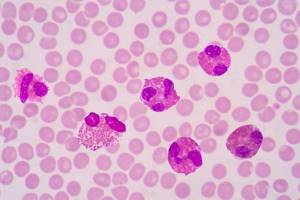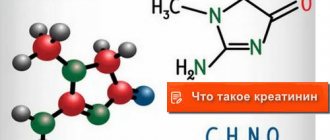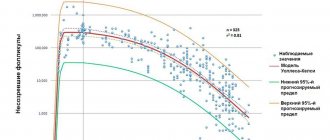How is a general blood test taken: from a vein or from a finger?
Blood for general analysis is taken both venous and capillary . That is, both from a vein and from a finger.
Analysis from capillary blood (from a finger) is less accurate: there is a high probability of distortion of the results associated with the blood collection procedure (compression of tissues, entry of tissue fluid, platelet aggregation, formation of microclots, etc.) Therefore, today a clinical blood test is taken only from a finger in cases where collecting venous blood is difficult or impossible. For example, with severe burns, when the patient’s veins are too small and thin, if there is a tendency to venous thrombosis, etc.
In newborns, a general blood test is usually taken from a finger prick.
Contraindications
If your child visits a massage therapist, it is necessary to complete the course or reschedule the date of collection of biological material. In addition, it is unacceptable to donate blood immediately after an X-ray examination, ultrasound or any physiotherapeutic procedures.
There are no absolute contraindications to the analysis. However, if a child suffers from certain diseases, in particular blood clotting disorders, low blood pressure, difficulties may arise during the collection of biomaterial. The nurse must be warned about this in advance.
Is it possible to smoke before taking a blood test?
Under the influence of nicotine, a large number of different hormones are produced that are aimed at suppressing the toxic effects. In addition, immediately after smoking a cigarette, the number of red blood cells in the blood increases sharply, and the level of leukocytes decreases. As a result of this process, not only does the viscosity of the blood increase, which inevitably affects the integrity of the blood vessels, but its structure also changes, and this cannot but affect the conduct of research.
Therefore, to obtain the most reliable data about the state of your own body, it is not recommended to smoke for 1-1.5 hours before the test.
What diseases are indicated by deviations from the norm?
It is worth noting that this does not always happen due to a pathological process. Sometimes the reasons are natural. Or parents forgot how to take a general blood test for their child, and, for example, fed him immediately before visiting the laboratory. Both pathological and physiological causes are described below.
One of the most important indicators is hemoglobin. This substance is an iron-containing protein found in red blood cells. When its concentration in the blood decreases, it is customary to talk about anemia. This is a pathological process characterized by a deficiency of oxygen molecules in the body, as a result of which the functioning of all systems is disrupted.
Reasons for decreased hemoglobin levels:
- Unbalanced diet. Anemia is often diagnosed in children who do not receive proper complementary foods.
- Pathologies of the digestive organs.
- Infectious diseases.
- Helminthic infestations.
- Incompatibility of the blood of the fetus and mother during pregnancy.
- The process of destruction of red blood cells occurs in the body.
- Impaired hemoglobin production.
- Insufficient bone marrow development.
- Congenital pathologies of organs with hematopoietic function.
An increase in hemoglobin levels is diagnosed extremely rarely. The main reasons for this condition:
- Pathologies of the cardiovascular system.
- Impaired kidney function.
- Diseases of liquid connective tissue.
- Pulmonary fibrosis.
- Oncological diseases.
- Pulmonary heart.
- Presence of extensive burns.
- Being in a stressful state (more often detected in schoolchildren).
- Smoking in adolescence.
Red blood cells are the most important formed elements of the basic biological material of humans. Their main purpose is to deliver oxygen molecules to every cell of the body.
When the level of red blood cells increases, it is customary to talk about a condition such as erythrocytosis. The main reasons for its occurrence:
- Congenital heart pathologies.
- Disruption of the hematopoietic system.
- Heart failure.
- Impaired functioning of the adrenal cortex.
- Pathologies of the respiratory system (for example, chronic obstructive pulmonary disease, asthma, bronchitis, etc.).
- Oncological diseases.
- Diabetes.
- Hypertension.
- Any pathology, the course of which is accompanied by vomiting, diarrhea and fever.
- Itsenko-Cushing's disease.
- Splenectomy.
- Extensive burns.
In the presence of erythrocytosis, hemoglobin is always elevated.
If the concentration of red blood cells is reduced, doctors diagnose erythropenia. The causes of this condition may be:
- Bleeding, including chronic bleeding.
- Deficiency of folic acid, iron or vitamins.
- Chronic kidney failure.
- Severe intoxication of the body.
- Radiation or chemotherapy.
- Lymphoma.
- Leukemia.
- Glomerulonephritis.
- Myelodysplastic syndrome.
- Autoimmune pathologies.
- Presence of a tumor in the bone marrow.
- Aplastic type anemia.
- Regular consumption of contaminated water.
- Being under stress.
- Overwork (both mental and physical).
- Hunger.
- Uncontrolled use of medications.
It is worth noting that against the background of erythropenia, the level of hemoglobin always decreases.
The color index is a specific feature. It can be used to judge the ratio of red blood cells and hemoglobin.
If the color index is reduced, this may indicate the following ailments:
- Pathologies of the hematopoietic system.
- Kidney failure.
- Hemoglobinopathies.
- Intoxication of the body with lead or chemicals.
- Anemia.
If there is an increase, the doctor may suspect one of the following pathologies:
- Chronic hypoxia.
- Oncology.
- Diabetes.
- Diseases of the endocrine system.
- Liver damage.
- Anemia.
- Pathologies of the heart or lungs.
Reticulocytes are platelets, but only immature ones. Their number allows you to find out at what speed the composition of liquid connective tissue is renewed.
If reticulocytes are elevated, this may indicate the presence of internal hemorrhage, anemia, malignant damage to the hematopoietic system, hypoxia, inflammatory processes, and infectious diseases. In addition, this condition is often a consequence of an overdose of antipyretics. That is why it is always important to remember how to take a general blood test for children. It is not advisable to take medications before collecting biomaterial.
The concentration of reticulocytes can be reduced due to anemia, thyroid dysfunction, kidney disease, uremia, and infectious processes. In this case, most often there is a significant deviation from the norm. It is better to entrust the interpretation of a child’s general blood test to a doctor. Only a specialist will be able to find out the reason for the deviation.
Platelets are plates that are responsible for the process of coagulation and the formation of blood clots. Normally, a general blood test in children should contain at least 160 (180 in children). If they are deficient, the doctor may suspect a malfunction of the coagulation system, which often occurs with hemophilia and other hereditary pathologies. In addition, platelet deficiency can occur due to anemia, infectious diseases and oncology.

If platelets are much higher than normal, this may indicate the presence of a chronic inflammatory disease (an example is tuberculosis). In addition, the following conditions may cause thrombocytosis:
- Enhanced synthesis of these elements by megakaryocytes located in the red bone marrow. Most often this happens with erythremia.
- The process of platelet utilization is very slow. This may be a consequence of surgical excision of the spleen.
- Platelets are not distributed correctly in the bloodstream. As a rule, this condition is a consequence of mental or physical stress.
It is worth noting that the doctor only suspects the presence of a dangerous pathology if the platelet concentration exceeds 800 thousand/l.
One of the most clinically significant indicators is ESR. If an inflammatory process occurs in the body, red blood cells become heavier and their sedimentation rate increases.
Leukocytes are the main weapon of the body's defense system. Their deviation from the norm in a general blood test in children in 95% of cases indicates the presence of an infection in the body or a dysfunction of hematopoiesis. They have many types: basophils, eosinophils, neutrophils, lymphocytes, monocytes.
Does alcohol affect blood tests?
You must not drink alcohol before taking the test ! There are several main reasons why drinking alcohol before a blood test is prohibited.
Alcohol reduces sugar and hemoglobin levels, negatively affects the content of red blood cells, and increases cholesterol levels. As a result of the action of alcohol in the liver, a decrease in lipid metabolism is observed. This indicator in the human body is very important before surgery. Therefore, doctors do not allow the consumption of alcoholic beverages on the eve of laboratory tests. Medical staff recommend stopping drinking alcohol two days before the tests.
When conducting tests for hepatitis, HIV, syphilis and some other diseases, you should not drink alcoholic beverages for at least 72 hours before the examination. Due to the influence of alcohol, examination results may be greatly distorted. If a person abstains from drinking alcohol on the eve of laboratory tests, in this case it is possible to obtain reliable results, establish the correct diagnosis and prescribe the necessary treatment.
Preparation rules
This stage is very important. Parents should be responsible for preparing for the study. If you do not take into account some nuances before collecting biomaterial, the interpretation of a general blood test in children may subsequently be carried out incorrectly. It is important to understand that liquid connective tissue reacts very sensitively to any changes.
Basic rules of preparation:
- Stop taking medications 14 days in advance. For example, if the child was treated for a completely different reason. If canceling the appointment is impossible, you must inform the doctor about this. The doctor will take this information into account when interpreting the results of the child’s general blood test.
- The day before and on the day of delivery of the biomaterial, it is necessary to avoid physical activity. It is recommended to take your baby for a walk before bedtime, and then put him to bed. For older children, you can read a book the day before, get a massage, or play calm games.
- If the blood sugar concentration is important to the doctor, you should not brush your child’s teeth in the morning. Older children should be prohibited from using chewing gum.
- After waking up, it is recommended to drink a glass of clean water without carbon. Information regarding whether to take a general blood test for a child on an empty stomach or not is presented below.
The psychological aspect plays a very important role. It is extremely important to prepare the child for the blood sampling process itself. If the child is older than 1 year, you can already try to explain to him that everything will go quickly and painlessly.
Clinical examination of liquid connective tissue is a highly sensitive indicator that allows you to detect even the slightest malfunction in the functioning of internal organs. At the same time, ignoring the need to comply with preparation rules can lead to false results.
General requirements before taking a general blood test
- Eliminate alcohol from your diet 24-72 hours before the test
- Children under 1 year of age should not eat for 30-40 minutes before the test.
- Children aged 1 to 5 years should not eat for 2-3 hours before the test
- Do not eat for 8 hours before the test, you can drink clean still water
- Avoid physical and emotional stress for 30 minutes before the test
- Do not smoke for 1-1.5 hours before the test
Complexes with this research
Male anti-aging diagnostics Monitoring of basic blood parameters in a man aged 40+ 8,210 R Composition
Female anti-aging diagnostics Monitoring of basic blood parameters in a woman aged 40+ 7,380 R Composition
Expanded hospital complex Expanded infectious screening for prevention and hospitalization RUB 4,520 Composition
IN OTHER COMPLEXES
- Advanced women's anti-aging diagnostics RUB 20,100
- Nutritionist recommends RUB 4,510
- Certificate for kindergarten, school, camp RUB 1,360
- Advanced anti-aging diagnostics in postmenopause RUR 20,420
- Prevention of childhood colds RUR 1,670
Memo to patients
It should be remembered that one of the important components of the recovery process is a correctly established diagnosis. But it cannot always be determined if the preparation for the prescribed tests was done incorrectly or was not of sufficient quality. Therefore, you should not neglect the recommendations given by your doctor or nurse so that you do not have to undergo the test again.
If something is unclear, it is better to ask again - now there are many clinics not only in Moscow, but also in other cities of the Russian Federation, where specialists will tell you the answer to any question regarding all types of laboratory tests. The main thing is not to forget that taking care of your health is a personal matter; entrusting it to someone else is not always advisable.







